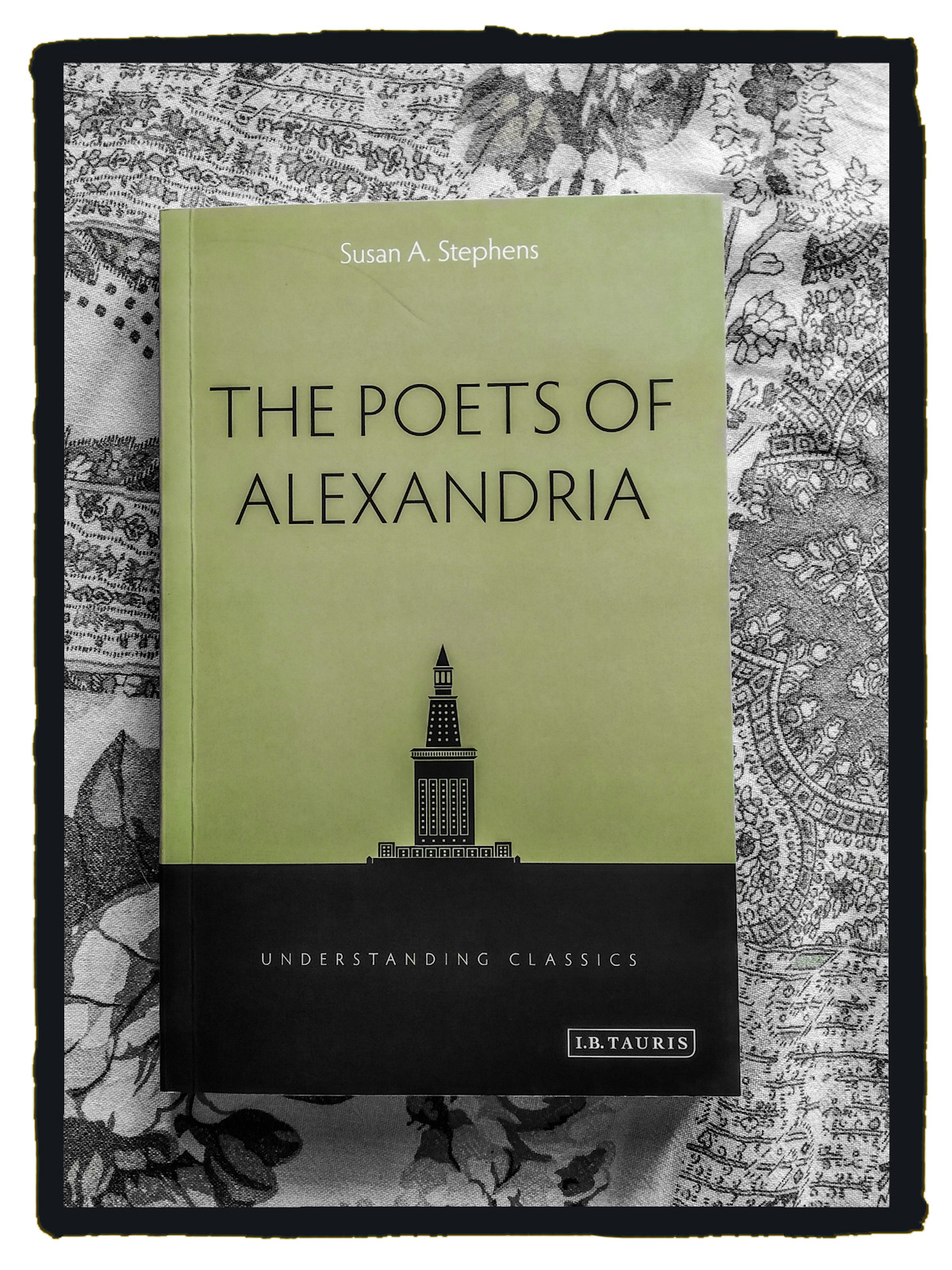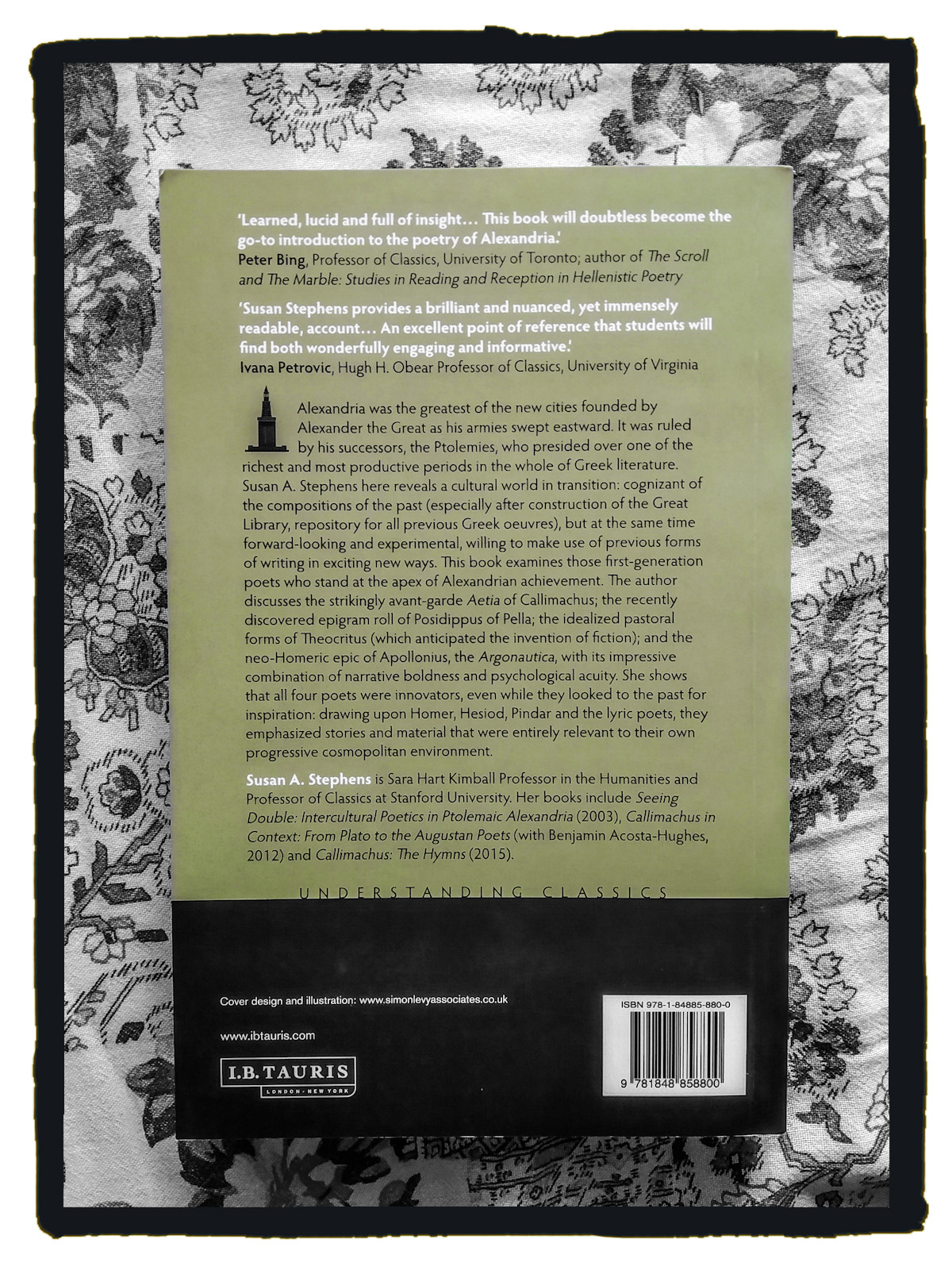English review: HERE.
Aforismi: QUI.
Buongiorno a tutti, grazie di essere su Alessandro III di Macedonia- la tua risorsa su Alessandro Magno! Oggi vi parlo di un libro molto interessante e molto dettagliato:
The Poets of Alexandria di Susan A. Stephens edito da I.B. Tauris
Voglio ringraziare tantissimo l’editore per avermi mandato la copia affinché potessi leggerla e recensirla! Passiamo subito alla recensione!


Alexandria was the greatest of the new cities founded by Alexander the Great as his armies swept eastward. It was ruled by his successors, the Ptolemies, who presided over one of the richest and most productive periods in the whole of Greek literature. Susan A Stephens here reveals a cultural world in transition: reverential of the compositions of the past (especially after construction of the great library, repository for all previous Greek oeuvres), but at the same time forward-looking and experimental, willing to make use of previous forms of writing in exciting new ways. The author examines Alexandria’s poets in turban. She discusses the strikingly avant-garde Aetia of Callimachus; the idealized pastoral forms of Theocritus (which anticipated the invention of fiction); and the neo-Homerian epic of Apollonius, the Argonautica, with its impressive combination of narrative grandeur and psychological acuity. She shows that all three poets were innovators, even while they looked to the past for inspiration: drawing upon Homer, Hesiod, Pindar and the lyric poets, they emphasized stories and material that were entirely relevant to their own progressive cosmopolitan environment.
Susan A Stephens is Sara Hart Kimball Professor in the Humanities and Professor of Classics at Stanford University. Her books include Seeing Double: Intercultural Poetics in Ptolemaic Alexandria (2003), Callimachus in Context: From Plato to the Augustan Poets (with Benjamin Acosta-Hughes, 2012) and Callimachus: The Hymns (2015).

4 stelle.
Reading time: dal 19 agosto al 9 ottobre 2019.

Sono contenta di aver avuto la possibilità di leggere The Poets of Alexandria perché è un libro fondamentale per chi come me si vuole approcciare alla poesia prodotta dopo la fondazione di Alessandria d’Egitto. Ci ho impiegato tantissimo a leggere questo libro anche se è corto, molto interessante, scorrevole e chiaro da leggere, per ragioni che non sono collegate al libro ma al mio tempo a disposizione.
Questo libro fa parte della collana Understanding Classics edita da Richard Stoneman e ogni volume è come una guida introduttiva all’argomento ma anche un valido strumento per gli studenti universitari e per chiunque volesse approfondirlo.
Understanding Classics is a specially commissioned series which aims to introduce the outstanding authors and thinkers of antiquity to a wide audience of appreciative modern readers, whether graduate students of classics, literature, philosophy and ancient history or generalists interested in the classical world.
Each volume – written by leading figures internationally – will examine the historical significance of the writer or writers in question; their social, political and cultural contexts; their use of language, literature and mythology; extracts from their major works; and their reception in later European literature, art, music and culture.
La Stephens introduce i poeti di Alessandria, infatti vengono analizzati Posidippo di Pella, Teocrito di Siracusa, Callimaco di Cirene e Apollonio Rodio. L’arco temporale è di una cinquantina d’anni e va dal regno di Tolomeo II ai primi anni di Tolomeo III, quindi dal 285 al 235 a.C. A quel tempo Alessandria era una città nuova, abitata da persone che non avevano più un’identità greca ed erano in cerca della loro appartenenza. Anche il regno dei Tolomei cercava un mito di fondazione e di legittimazione del loro potere, infatti cercarono di trovare il modo di imparentarsi con Alessandro Magno per farsi considerare dei faraoni. In questo contesto si inseriscono i quattro autori presi in esame dalla Stephens: autori che sperimentarono e furono innovativi per il loro tempo. Non bisogna dimenticare che Alessandria è stata un punto focale della cultura per secoli grazie alla sua Biblioteca.
L’autrice analizza e confronta le produzioni dei quattro poeti che spesso, anzi praticamente sempre, non ci sono arrivate nella loro integralità. Ogni opera degli autori viene presa in esame in ogni suo aspetto. Non commento la parte di analisi degli autori perché non ho le conoscenze per farlo, ma posso dire che l’ho letta, mi è piaciuta e mi è sembrata esaustiva. L’autrice traduce i passi che riporta così non sono inaccessibili a chi come me non conosce il greco. L’ideale sarebbe leggere questo libro accompagnando la lettura delle opere dei quattro autori in esso citate perché altrimenti rimane una lettura un po’ improduttiva, ma bisogna intendere questo libro come un aiuto all’approccio dei quattro autori. L’autrice ha anche analizzato nell’Afterwards come questi poeti hanno influenzato la poesia successiva, romana, rinascimentale e come sono stati ripresi anche nei tempi più recenti. Non mancano un bel po’ di pagine finali con le note e la bibliografia!
Per me è stata una lettura molto interessante e adesso sono curiosa di leggere il volume Pindar edito e curato dallo stesso Richard Stoneman.
Questa lettura è piaciuta anche alla mia gatta 😀


Chiudo la recensione lasciandovi qualche altra informazione:
Richard Stoneman (Editor), Brian Brock (Editor), Susan F. Parsons (Editor)
| ISBN-13: | 9781848858800 |
|---|---|
| Publisher: | Bloomsbury Academic, I.B. Tauris |
| Publication date: | 05/30/2018 |
| Series: | Understanding Classics |
| Pages: | 208 |
| Product dimensions: | 5.35(w) x 8.54(h) x 0.65(d) |
Table of Contents
Maps viii
Acknowledgements xi
Abbreviations xii
Transliteration xiii
Introduction: Changing Places 1
I The Canon of Truth: Posidippus of Pella 25
II The Bucolic Imagination: Theocritus of Syracuse 57
III Beyond the Reach of Envy: Callimachus of Cyrene 85
IV Destiny’s Voyage: Apollonius of Rhodes 115
V Afterwards 141
Notes 161
Bibliography 177
Index 185
WEBSITE I.B. Tauris (BLOOMSBURY)
Ancora un grazie all’editore per questa opportunità! Spero di avervi fatto interessare al libro! Grazie di avermi letta, buona giornata,





L’ha ripubblicato su Life Is Like A Wave Who Rises And Fallse ha commentato:
a tutti, ecco una nuova recensione di un libro molto bello:
The Poets of Alexandria di Susan A. Stephens
4 stelle.
Reading time: dal 19 agosto al 9 ottobre 2019.
Lettura n° 21 del 2019.
"Mi piace""Mi piace"